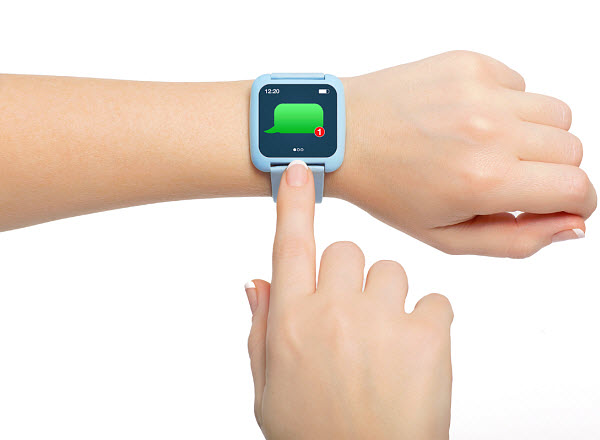The company has now filed for a patent for this type of wearable technology device.
It looks as though Microsoft is looking into becoming another player in the smartwatches game, as the U.S. Patent Office has now publically released an application that was made by the software giant for a design that could place the company in competition against Samsung, Google, and potentially Apple (whenever it makes its own entry into the market).
This application was just released last week, though it was initially filed back in October 2012.
The Microsoft application details various plans for a type of wristwatch that could be used as a music player, a fitness tracker, a messaging device, and to make phone calls. The face for these smartwatches would be able to detach from their bands in order to connect it to a charger. If the company is, indeed, pursuing wearable technology (and this patent application would suggest that it is), the Microsoft will be joining the companies that are making a rather late entry into the market, as Apple is doing.
Other smartwatches have not only been on the market for a while, but they have had multiple generations.
The Galaxy Gear wearable technology, and the Pebble, are good examples of devices that have now had the opportunity to start to build a customer base, to market themselves, and to release more than one version of the device as a better understanding of the use and the tech is created. Another large participant in this market will be Google, when the Moto 360 is released in the United States, this summer. Rumors of Apple’s wearables have been circulating for ages, but as is the tradition from that company, nothing official has been heard about a specific device.
There is also existing competition outside of the giants in the industry, as many startups have been creating their own devices that have started to become popular. Pebble may have only been a startup, but it is still grouped among the serious players as it managed to sell 400,000 of its devices in 2013.
The patent doesn’t make it clear exactly what Microsoft’s smartwatches will be or even if they will be released to the public. As of the time of the writing of this article, the company had yet to release a statement on the matter.
Wearable devices could serve as a distraction for many
Wearable technology is set to go mainstream in just a few short years, and what that means for people’s daily lives is not yet certain. Early adopters of devices like smart watches and augmented reality glasses have found that these products are quite entertaining, which may present a problem when it comes to productivity. Because wearable devices allow for a more seamless integration into the digital space, the constant availability of entertainment and digital social interaction may prove quite distracting for some.
A recent study conducted in the United Kingdom by Goldsmiths, University of London, found that those using wearable devices could boost productivity by 8%. The study was focused on a media company with some 120 employees and the devices these people used were specifically designed to improve productivity, concentration, and posture. The study suggests that some devices could have a positive impact on productivity, but it also found that wearable technology led to a 9% decrease in alertness among the media company’s employees. These people did report a higher level of job satisfaction, however.
Most devices are not designed with productivity in mind
 Not all wearable devices are designed with productivity in mind. Most are developed as entertainment products and social networking tools. Augmented reality glasses, for instance, are typically used as a platform through which digital media is consumed. Smart watches are also used for similar purposes, though these devices have limited features when compared to smartphones and tablets. These devices could be used by students, for example, for a wide range of purposes, but will likely be most popular as entertainment tools. For many people, these devices could lead to a drastic decrease in productivity.
Not all wearable devices are designed with productivity in mind. Most are developed as entertainment products and social networking tools. Augmented reality glasses, for instance, are typically used as a platform through which digital media is consumed. Smart watches are also used for similar purposes, though these devices have limited features when compared to smartphones and tablets. These devices could be used by students, for example, for a wide range of purposes, but will likely be most popular as entertainment tools. For many people, these devices could lead to a drastic decrease in productivity.
Wearable devices leading to a decrease in productivity is not an issue that is guaranteed to happen. Like smartphones and tablets, wearable devices tend to have access to mobile applications. Some of these applications are designed specifically with productivity in mind. These apps can help cut back on distraction by limiting access to the Internet or preventing certain digital content from being viewed for a specified amount of time.


 Not all wearable devices are designed with productivity in mind. Most are developed as entertainment products and social networking tools. Augmented reality glasses, for instance, are typically used as a platform through which digital media is consumed. Smart watches are also used for similar purposes, though these devices have limited features when compared to smartphones and tablets. These devices could be used by students, for example, for a wide range of purposes, but will likely be most popular as entertainment tools. For many people, these devices could lead to a drastic decrease in productivity.
Not all wearable devices are designed with productivity in mind. Most are developed as entertainment products and social networking tools. Augmented reality glasses, for instance, are typically used as a platform through which digital media is consumed. Smart watches are also used for similar purposes, though these devices have limited features when compared to smartphones and tablets. These devices could be used by students, for example, for a wide range of purposes, but will likely be most popular as entertainment tools. For many people, these devices could lead to a drastic decrease in productivity.